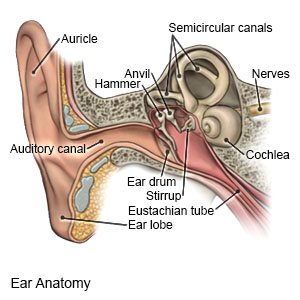Hearing Loss
Medically reviewed by Drugs.com. Last updated on Aug 4, 2025.
Hearing loss means you have trouble hearing or you cannot hear at all in one or both ears. Hearing loss can happen suddenly or slowly over time.
DISCHARGE INSTRUCTIONS:
Return to the emergency department if:
- You have fluid, pus, or blood leaking from your ear.
- You have sudden, severe hearing loss.
Call your doctor or audiologist if:
- You have a fever.
- You have ear pain that is getting worse.
- You have ringing in your ears or dizziness that will not go away.
- You have questions or concerns about your condition or care.
Types of hearing loss:
- Conductive hearing loss occurs when there is a problem with the outer or middle ear. Sound waves cannot reach your inner ear. This type of hearing loss may be caused by earwax buildup, fluid, or a punctured ear drum. It can often be treated by correcting the cause of the problem.
- Sensorineural hearing loss is caused by damage to parts of the inner ear. There is usually no cure for sensorineural hearing loss.
- Mixed hearing loss includes both conductive and sensorineural hearing loss.
 |
Manage your hearing loss:
- Protect your hearing. Use ear plugs or ear protectors if you do activities that are very loud. These include using a lawnmower and power tools or going to a concert that has loud music. Use well-fitting foam earplugs that completely block your ear canal. Do not listen to loud music through headphones or earphones.
- If you have hearing aids, wear them regularly. Talk to your healthcare provider if you are having trouble using your hearing aid.
- Ask about cochlear implants. If hearing aids do not help you, talk to your healthcare provider. Cochlear implants may help you hear better. A cochlear implant is a tiny device that is put into your cochlea (part of your inner ear) during surgery.
- Assistive listening devices (ALDs) pic up sound and send it through earphones or a headset. ALDs can help you hear better when you are in a place with background noise. Examples include theaters, classrooms, or auditoriums. ALDs are also available for phones. ALDs can be used alone or with hearing aids or cochlear implants.
- Tell people that you have hearing loss. Ask people to face you directly when they speak to you, and to slow down if they are speaking too fast. When you are in a group setting, sit in a location where you can clearly see the faces of the people who are speaking. Ask people not to speak loudly or shout when they are speaking to you. Try to talk with others in a quiet place. Background noise makes it harder for you to hear.
- Pay close attention to your surroundings when you drive. Do not talk to people in your car while you are driving. Watch for problems on the road or approaching emergency vehicles.
Follow up with your doctor or audiologist as directed:
Write down your questions so you remember to ask them during your visits.
© Copyright Merative 2025 Information is for End User's use only and may not be sold, redistributed or otherwise used for commercial purposes.
The above information is an educational aid only. It is not intended as medical advice for individual conditions or treatments. Talk to your doctor, nurse or pharmacist before following any medical regimen to see if it is safe and effective for you.
Learn more about Hearing Loss
Treatment options
Care guides
Further information
Always consult your healthcare provider to ensure the information displayed on this page applies to your personal circumstances.
